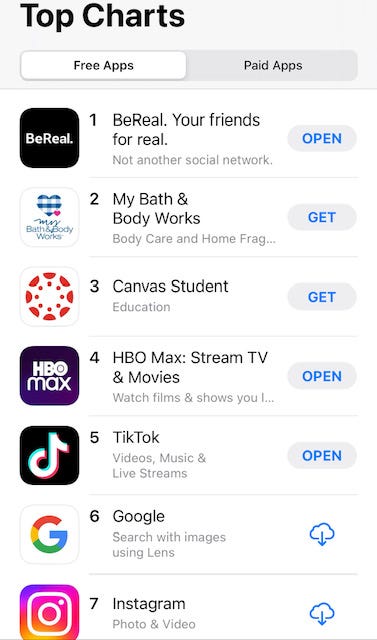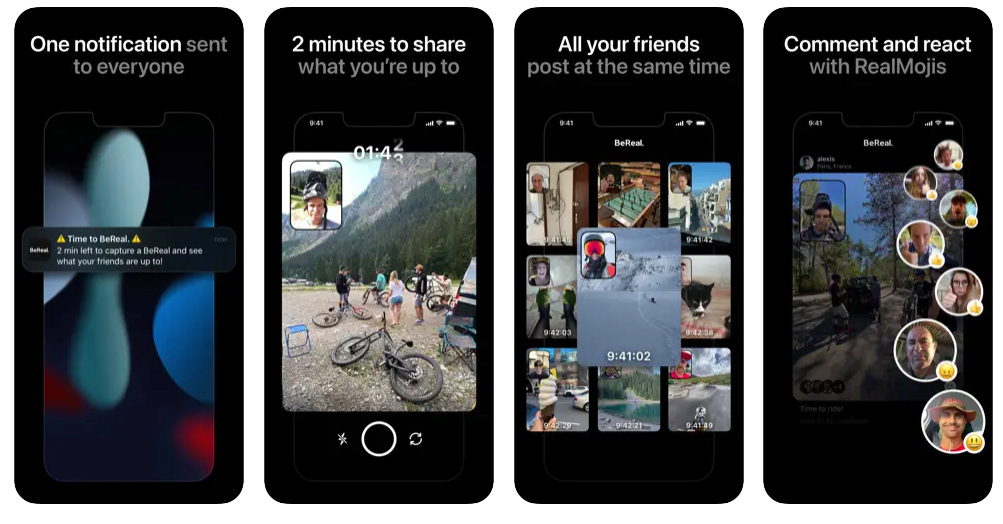What’s the Deal with BeReal?
And should you let your teen use it?
I have received a handful of emails and texts the last couple of weeks about a relatively new social media platform called “BeReal.” The app has been on my radar since around March, and while it was growing in popularity back then, it has really exploded the last few weeks.
Given the personal messages I’ve received and the popularity of this new social media platform, I figured it would be good if I wrote up a quick explainer for you, whether you’re a parent, a ministry leader, or someone else who may be wondering, “What is this app and should I let my teen/students/etc. use it?”
So let’s get into it.
The Basics of BeReal
Founded by Frenchman and former GoPro employee Alexis Barreyat, BeReal was launched in 2020 and began gaining a lot of steam earlier in the spring of 2022. Like many trends centered on teenagers, BeReal’s momentum was slowed by summer break. But since the end of the summer and now that many schools around the country are now back in session, BeReal sits comfortably at the top of the Apple App Store. Teenagers got back together and the word got out: BeReal is for real.
BeReal is a photo-based social media app that is set up to facilitate spontaneous, unfiltered photo-sharing in an effort to recapture the less-polished Instagram days of yore before everyone was a Creator and only posted the most fascinating, photogenic parts of their lives.
The app creates this more “authentic” (theoretically, anyway) environment by notifying users via a smartphone notification that it is “⚠️ Time to BeReal. ⚠️” at a random time each day—users in the same timezone will have the same posting time each day—during which the users have two minutes to post.
The picture(s) posted by users on BeReal are from both the front and back cameras on the user’s smartphone, and the photos cannot be edited or filtered in any way.
BeReal users can post late, after the two-minute window has passed, but their post will be marked as “Posted Late,” so other users know that it may have been staged. Posting, whether on time or tardy, is vital because without posting your own pictures, you can’t view your friends’ pictures.
That’s really it.
The Appeal of BeReal
BeReal is the purest social media platform in existence right now. There are no ads for chic shoes or leather bags on BeReal. There are no algorithms deciding which friends we see and don’t see. Conspiracy theorists haven’t been using BeReal to drive skeptics deeper down dark rabbit holes of foolishness.
BeReal embodies what all of us once loved about social media: the ability to spontaneously socialize with our friends on the internet, free of all of the toxic tendrils of the attention economy that has complicated virtually every other platform.
This is the appeal of BeReal for all of its users, the majority of which seem to be the same teenagers consuming content on YouTube and TikTok everyday.
We don’t need to wonder what makes BeReal so appealing, especially to teenagers raised on Instagram. Spontaneity and authenticity were once more present on Instagram than they are today—Instagram hasn’t felt authentic for years now. In BeReal, teenagers who faintly remember the more authentic-feeling days of Instagram—or a generation of young people who have never truly known a social media platform that promotes authenticity—have the opportunity, at least for now, authentically share their lives with their friends in a social media space.
Whether or not BeReal actually generates more authentic posts and interactions than other social media platforms is surely a matter for debate and can’t really be proven, but at least the systems are in place to encourage such activity. And its that distinctive that makes it appealing. Also it has a Wordle-like appeal in that it is constrained. You can only post in the two-minute window, once per day—otherwise you get the “late” label on your post.
One wonders how long BeReal will be in such a pure, attractive state. Surely ads will have to be integrated into the platform at some point. Influencers will figure out a way to monetize their presence on BeReal. Perhaps even another social media company would buy it. If that doesn’t happen, it isn’t hard to imagine Snapchat or Instagram copying the BeReal model and adding a feature to their already-existing platforms and effectively kill BeReal. In fact, just yesterday it was leaked that Instagram is already testing a prototype. Go figure!
How to Handle BeReal as a Parent or Ministry Leader
How should you handle BeReal with teenagers in your home or students in your student ministry? This is a good question without a universal answer. But I’ll give you my general impressions of the platform with regard to questions like “Should I let my teen use BeReal?”
Whether or not you let your teen(s) use BeReal is a personal decision that I can’t make for you, and my advice about BeReal would be the same as any other social media platform: Proceed with caution.
Certainly if you already let your teenager(s) use Snapchat or Instagram there is nothing more sketchy or concerning about BeReal than those platforms. So if you find yourself in that camp, I would say you don’t have much reason to deny access to BeReal.
But, if you do find yourself in the more “concerned” camp that has led to you restrict access to Snapchat and Instagram, BeReal may be a bit more “safe” from your perspective.
What is nice about BeReal from the perspective of concerned parents is that there is currently no direct messaging feature or “disappearing messages” feature that has spooked many parents away from letting their kids use Snapchat or even Instagram. In that regard, because all of the content on BeReal is public—for now, anyway—it is perhaps a bit more minor-friendly than some other apps that may allow for more sketchy, secretive behavior. Of course this could change any day if/when BeReal adds such a feature, but for now all content on BeReal is out in the open.
Likewise, another point in favor of BeReal over other apps is that the app is designed to make seeking “fame” or lots of attention basically fruitless. You’re only really supposed to connect with people you know on BeReal. There are virtually no aspects of the platform that encourage you to connect with strangers. And there are no aspects to the platform that would cause anyone to “go viral” or get famous in some way. It is very much meant to be a more “local” app in which you communicate with people you actually know, or are at least contacts in your phone.
Also, for what it’s worth, here is Apple’s brief App Privacy notice for the platform:
The app collects plenty of personal information, but it doesn’t appear to collect anything more intrusive than other social media apps.
Whether or not you allow the teens in your home clamoring for access to BeReal to download the app is your call. I do think it is more teen-friendly than many other social media apps out there, but it certainly still comes with many of the social pressures and temptations to get attention that accompany every other social media platform.
Let me know what you think you’ll do in the poll below! Responses are anonymous.





Not a parent of student but a youth minister: I would much rather kids use BeReal than any other platform at the moment. It has some built-in restrictions that don’t encourage binging or other harmful behavior.
My only real concern is what time these notifications go out, the peer pressure that it creates, and what it might disrupt in the process. I could easily foresee an entire school period getting thrown into turmoil because a bunch of students got a notification, all at the same time, to make a post within 2 minutes or be branded “late”. I will not be surprised if that creates its own version of peer pressure which, in turn, feeds into insecurities and struggles a teen is having if they’re not able to participate or if they’re late. Hopefully I’m wrong on that.